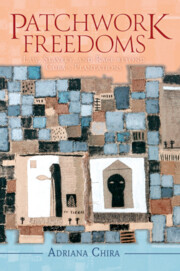Book contents
- Patchwork Freedoms
- Afro-Latin America
- Patchwork Freedoms
- Copyright page
- Dedication
- Contents
- Figures
- Maps
- Tables
- Acknowledgments
- Manuscript Sources and Abbreviations
- Note on Language and Region
- Maps
- Introduction
- 1 Unenclosed People, Unenclosed Lands
- 2 Foreign Implants
- 3 Keeping People Put
- 4 Manumission’s Legalities
- 5 “A Freedom with Further Bonds”
- 6 “Para levantar los negros y proclamar la República”
- Conclusion
- Book part
- Bibliography
- Index
4 - Manumission’s Legalities
From Need-Based Prerogatives to Merit-Based Entitlements
Published online by Cambridge University Press: 10 February 2022
- Patchwork Freedoms
- Afro-Latin America
- Patchwork Freedoms
- Copyright page
- Dedication
- Contents
- Figures
- Maps
- Tables
- Acknowledgments
- Manuscript Sources and Abbreviations
- Note on Language and Region
- Maps
- Introduction
- 1 Unenclosed People, Unenclosed Lands
- 2 Foreign Implants
- 3 Keeping People Put
- 4 Manumission’s Legalities
- 5 “A Freedom with Further Bonds”
- 6 “Para levantar los negros y proclamar la República”
- Conclusion
- Book part
- Bibliography
- Index
Summary
During the first half of the nineteenth century, no written law numerated the rights of conditionally and partially free individuals, the vast majority of those who would eventually obtain manumission. How much of their time could such individuals control? Could they be punished? Could they live independently? Were the children born of mothers who held this ambiguous status free or enslaved? In courts of first instance, in the absence of illuminating legislation, judges turned to witnesses for arbitration, as enslavers and enslaved vied over the terms of their oral contracts and public reputations. The freedom that emerged from such vernacular legalism was not liberal autonomy. Rather, it was situational dependence on others, usually free and enslaved Afro-descendants who had participated in the coartación in some capacity, and who arbitrated casuistically. Freedom’s legal meanings emerged through such negotiations that belonged to local custom. Historically, these negotiations went back to the cobreros’ customary access to land and coartación as subsistence-based rights. By the 1830s, some enslaved people had redefined such need-based rights as merit-based entitlements.
Keywords
- Type
- Chapter
- Information
- Patchwork FreedomsLaw, Slavery, and Race beyond Cuba's Plantations, pp. 142 - 179Publisher: Cambridge University PressPrint publication year: 2022



